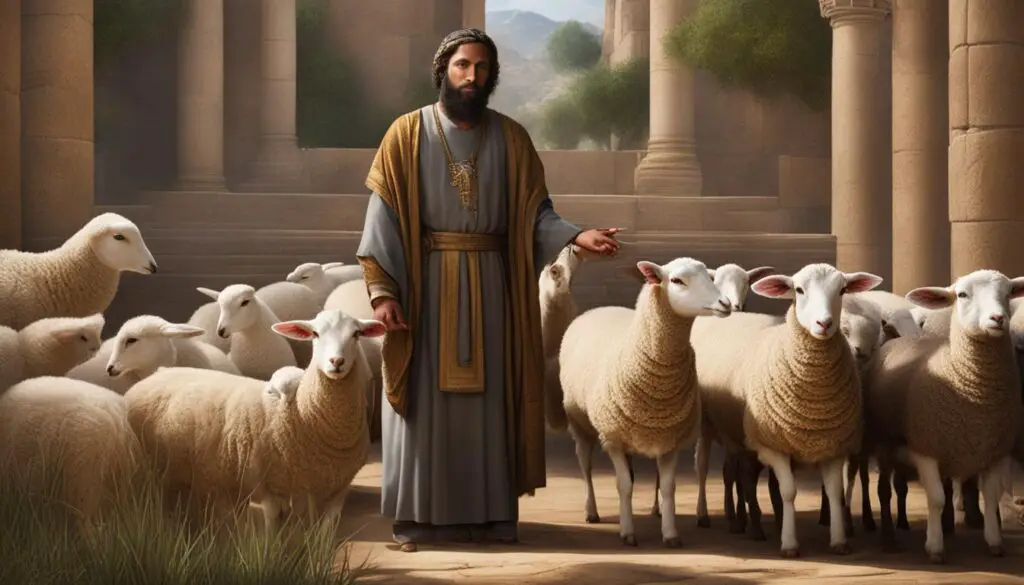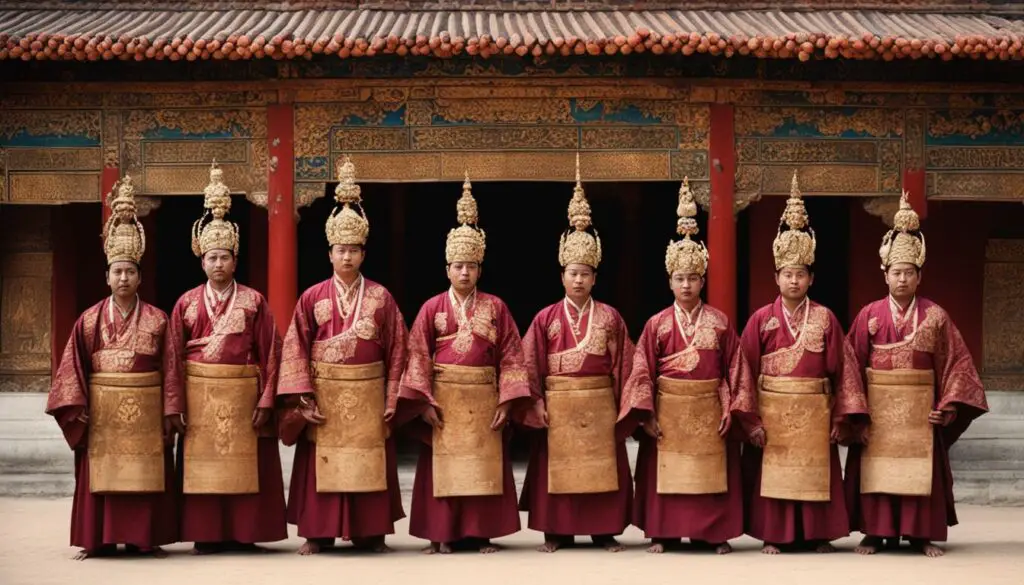In the Bible, the term “eunuch” is mentioned several times in both the Old and New Testaments. While the term is often associated with castration, it can have a broader meaning that includes those who choose to remain unmarried for religious reasons. The biblical definition of eunuch is a complex topic that requires a comprehensive understanding of the cultural and historical context in which it is used. Let’s explore the different aspects of the Bible definition of eunuch in this guide.
Key Takeaways:
- The term “eunuch” in the Bible refers to individuals who may be castrated or choose to remain unmarried for religious reasons.
- The etymology of the word “eunuch” provides insights into the historical significance and cultural context of eunuchs in biblical times.
- Eunuchs played important roles in ancient societies, particularly in royal courts and religious settings.
- The Bible contains stories and teachings about eunuchs, highlighting their significance and challenges they faced.
- The biblical definition of eunuch invites us to reflect on inclusivity and acceptance in our own lives.
The Etymology of the Word Eunuch
The word “eunuch” has an intriguing etymology that sheds light on its historical significance in biblical times. The term is derived from the Greek word “eunouchos” and the Hebrew word “saris.” These words refer to individuals who served important roles in the royal court and religious settings.
In the Greek language, “eunouchos” originally referred to a castrated man who served as a guardian of the harem or a high-ranking official in the royal court. Similarly, in Hebrew, the word “saris” denoted a eunuch who performed duties such as managing the king’s household and ensuring the safety of the royal family.
By exploring the etymology of the word “eunuch,” we gain valuable insights into the cultural context and societal roles of these individuals in biblical times. It helps us understand that the term encompasses more than just castrated men and includes those who held specific positions of power and influence in ancient societies.
| Sr. No. | Book | Chapter | Verse |
|---|---|---|---|
| 1 | Genesis | 39 | 1 |
| 2 | Isaiah | 56 | 3-5 |
| 3 | Acts | 8 | 27 |
“And there was an Ethiopian eunuch, a court official of Candace, queen of the Ethiopians, who was in charge of all her treasure. He had come to Jerusalem to worship…” – Acts 8:27
The biblical references to eunuchs further emphasize their significance in biblical narratives and highlight their involvement in important events and interactions with well-known figures. These references provide valuable insights into the understanding and portrayal of eunuchs in the Bible.
The Significance of Eunuchs in Biblical Times
Eunuchs played multifaceted roles in biblical times, serving in various capacities such as officials, advisers, and protectors of the royal court. Their presence in influential positions demonstrates their significance in maintaining order and ensuring the smooth functioning of political and religious systems.
Moreover, eunuchs challenged societal norms and expectations by their castration or choice to remain unmarried. Their unique circumstances provided a different perspective on gender and sexuality, inviting discussions on the diversity of human experiences and challenging rigid social constructs.
Exploring the biblical understanding of eunuchs allows us to delve deeper into the historical, cultural, and theological contexts of the Bible. It encourages us to reflect on the lessons and insights we can draw from their stories, ultimately contributing to a more inclusive and accepting society.
Eunuchs in Hebrew Scriptures
In the Hebrew Scriptures, eunuchs are mentioned in various contexts, shedding light on their roles and experiences in biblical times. Eunuchs served as officials, guards, and advisers in the royal court, showcasing their significance and influence in society. While some eunuchs were castrated males, others were considered eunuchs due to their choice to live without marrying.
One notable example of a eunuch in the Hebrew Scriptures is Ebed-Melech, who played a crucial role in rescuing the prophet Jeremiah from a cistern (Jeremiah 38:7-13). Ebed-Melech, an Ethiopian eunuch, demonstrated loyalty and compassion, highlighting the diverse backgrounds and capabilities of eunuchs. This biblical account not only showcases the historical presence of eunuchs but also challenges societal norms by portraying them as individuals who can actively contribute to the well-being of others.
Eunuchs in the Hebrew Scriptures: Key Examples
| Name | Role | Significance |
|---|---|---|
| Ebed-Melech | Rescued the prophet Jeremiah | Demonstrated loyalty and compassion |
| Potiphar | High-ranking official in Pharaoh’s court | Owned Joseph, who became a trusted advisor |
| Ashpenaz | Chief of the eunuchs in Babylon | Responsible for training Daniel and his companions |
These examples provide a glimpse into the diverse roles and contributions of eunuchs in biblical times, challenging traditional notions of gender and status. The mention of eunuchs in the Hebrew Scriptures invites us to consider the complexity of human identities and the multi-layered understanding of gender in ancient societies.
Eunuchs in the New Testament
In the New Testament, eunuchs are mentioned in several passages, providing insights into their significance in the biblical narrative. One notable mention is in Matthew 19:11-12, where Jesus discusses different types of eunuchs. He mentions those who are born as eunuchs, those who are made eunuchs by others, and those who choose to become eunuchs for the sake of the kingdom of heaven. This passage highlights the acceptance and recognition of eunuchs in the early Christian community.
The significance of eunuchs in the New Testament extends beyond the teachings of Jesus. In Acts 8:26-40, we encounter the story of the Ethiopian eunuch. This eunuch, a high-ranking official in the court of the queen of Ethiopia, is encountered by Philip, one of the early disciples of Jesus. Through their interaction, we see the inclusivity of the gospel message, as the eunuch is baptized and welcomed into the Christian faith.
“Do not let the foreigner joined to the Lord say, ‘The Lord will surely separate me from his people’; and do not let the eunuch say, ‘I am just a dry tree.’ For thus says the Lord: To the eunuchs who keep my sabbaths, who choose the things that please me and hold fast my covenant, I will give, in my house and within my walls, a monument and a name better than sons and daughters; I will give them an everlasting name that shall not be cut off.” – Isaiah 56:3-5
The mention of eunuchs in the New Testament and their inclusion in the teachings of Jesus reflect a broader message of acceptance and love. These passages emphasize the spiritual value and significance of eunuchs within the kingdom of God, challenging societal norms and promoting inclusivity.
| Type of Eunuch | Reference | Significance |
|---|---|---|
| Born Eunuchs | Matthew 19:11-12 | Recognizing those who are born with the identity of a eunuch |
| Made Eunuchs | Matthew 19:11-12 | Highlighting the experiences of those who were castrated by others |
| Chosen Eunuchs | Matthew 19:11-12 | Exploring the intentional choice of some individuals to become eunuchs for the sake of the kingdom of heaven |
| Ethiopian Eunuch | Acts 8:26-40 | Illustrating the acceptance and baptism of a eunuch into the Christian faith |
Historical and Cultural Context of Eunuchs in Biblical Times

To fully understand the biblical definition of eunuch, it is essential to consider the historical and cultural context of biblical times. Eunuchs played significant roles in ancient societies, particularly in royal courts and religious settings. Their castration or choice to remain unmarried had symbolic and practical implications that reflected power dynamics, social norms, and religious beliefs of the time.
During biblical times, eunuchs held positions of influence and power in royal courts. They often served as trusted advisors, counselors, and administrators. Their physical castration, which rendered them unable to father children, symbolized their loyalty to the ruling monarch and ensured they would not pose a threat to the royal bloodline. Eunuchs were seen as loyal and obedient servants, devoted solely to their duties.
Furthermore, eunuchs played important roles in religious settings, particularly in ancient Near Eastern and Mediterranean cultures. They were often entrusted with sacred duties, such as guarding temple precincts, performing religious rituals, and serving as intermediaries between gods and humans. Their perceived purity, resulting from their castration, made them suitable for these religious roles.
Despite their elevated societal status, eunuchs were still considered outside the traditional gender norms of the time. Their inability to procreate and fulfill societal expectations of marriage and family added to their otherness. However, their presence in biblical narratives highlights the complexity of gender and sexuality in ancient societies, challenging modern assumptions and providing valuable insights into a world far different from our own.
Interpretation and Perspectives on Eunuchs in the Bible
Scholars have offered diverse interpretations and perspectives on the biblical definition of eunuchs. These varying opinions contribute to a richer understanding of this complex topic.
Some scholars advocate for a literal interpretation of eunuchs in the Bible, viewing them as castrated males or individuals who choose to remain unmarried for religious reasons. They argue that the biblical definition reflects the historical context of ancient societies, where eunuchs served important roles in the royal court and religious settings. According to this perspective, eunuchs symbolize sacrifice, devotion, and a unique relationship with God.
On the other hand, some scholars propose metaphorical or symbolic understandings of eunuchs in the Bible. They argue that the term represents marginalized groups, such as those who do not conform to traditional gender or sexual norms. These interpretations emphasize inclusion, acceptance, and the breaking of societal barriers. They highlight the significance of eunuchs in challenging societal expectations and embodying the principles of love, justice, and compassion.
“The biblical definition of eunuchs is not limited to castration or celibacy, but rather encompasses a broader understanding of diverse identities and experiences. It invites us to embrace inclusivity and challenge social constructs that limit and marginalize individuals.” – Dr. Rachel Johnson, Theological Scholar
Theological and Cultural Lenses
Interpreting the Bible definition of eunuch also requires considering various theological and cultural lenses. Different religious traditions and perspectives shape how eunuchs are understood and valued. Some theological frameworks emphasize the importance of celibacy and abstinence, while others highlight the celebration of diverse identities and the acceptance of non-normative gender and sexual expressions. Cultural factors, such as societal norms and historical context, further shape interpretations of eunuchs in the Bible.
Challenging Assumptions
Exploring the interpretations and perspectives on eunuchs in the Bible challenges our assumptions and encourages us to question societal norms. It prompts us to consider the diversity of human experiences and the importance of acceptance and inclusivity. By engaging with these different opinions, we gain a deeper understanding of the biblical narrative and its relevance to contemporary discussions on gender, sexuality, and identity.
| Opinion | Key Points |
|---|---|
| Literary Interpretation | – Eunuchs represent castrated males or unmarried individuals in religious contexts. – Symbolize sacrifice, devotion, and unique relationships with God. |
| Metaphorical/Symbolic Interpretation | – Eunuchs symbolize marginalized groups or those who don’t conform to traditional norms. – Emphasize inclusion, acceptance, and breaking societal barriers. |
| Theological and Cultural Lenses | – Different religious traditions and cultural contexts shape interpretations of eunuchs. – Theological frameworks range from celebrating diverse identities to emphasizing celibacy and abstinence. |
| Challenging Assumptions | – Exploring diverse opinions on eunuchs challenges societal norms. – Encourages acceptance, inclusivity, and reflection on contemporary discussions of gender and sexuality. |
Eunuchs in Bible Stories

Throughout the Bible, there are several stories that feature eunuchs playing significant roles. These narratives provide us with valuable insights into the lives and experiences of eunuchs in biblical times and offer a glimpse into how they were portrayed and valued in the biblical context.
One notable story involving a eunuch is found in the book of Esther. In this account, Hegai, the eunuch in charge of the harem, plays a pivotal role in helping Esther become the queen and eventually save her people from destruction. Hegai’s position as a eunuch highlights his trusted status within the royal court and his significant contributions to the unfolding of the story.
“And the eunuch, who was in charge of the women, favored Esther and he was good in her eyes, so he hastened her purification and her provision, giving her seven girls, who were fitting for her, from the king’s palace, and he treated her and her maids kindly, making their appearance in the best possible manner.” – Esther 2:9
Another well-known story involving a eunuch is documented in the book of Acts. Philip encounters an Ethiopian eunuch who had been reading the book of Isaiah but did not fully understand its meaning. Philip explains the Scripture to him, leading the eunuch to become a believer and be baptized. This story showcases the inclusivity of the early Christian community, as the eunuch’s gender identity or status did not hinder his acceptance into the faith.
These and other Bible stories featuring eunuchs provide us with rich narratives that shed light on their roles, experiences, and interactions within the biblical context. By examining these stories, we can gain a deeper understanding of how eunuchs were valued and included in the biblical narrative.
| Story | Book | Key Eunuch |
|---|---|---|
| The rise of Esther | Esther | Hegai |
| The conversion of the Ethiopian | Acts | Ethiopian Eunuch |
| The loyalty of Ebed-melech | Jeremiah | Ebed-melech |
Right and Wrong: Biblical Teachings on Eunuchs

The biblical teachings on eunuchs offer a complex and nuanced understanding of their place in society and religion. While some passages highlight the acceptance and inclusion of eunuchs in the kingdom of God, others contain restrictions and regulations regarding their participation in religious practices. Let’s explore the various biblical teachings on eunuchs and their broader theological implications.
One of the significant biblical passages that addresses eunuchs is found in Matthew 19:11-12. In this passage, Jesus discusses different types of eunuchs, including those born as eunuchs, those made eunuchs by others, and those who choose to become eunuchs for the sake of the kingdom of heaven. This teaching from Jesus acknowledges and affirms the diverse experiences and identities of eunuchs.
However, it’s essential to note that other passages in the Bible contain specific regulations regarding eunuchs. For example, Deuteronomy 23:1 states that “No one who has been emasculated by crushing or cutting may enter the assembly of the Lord.” This verse suggests restrictions on eunuchs’ participation in religious gatherings, possibly due to cultural and purity-related concerns.
These contrasting teachings on eunuchs in the Bible reflect the complexities of religious and societal norms of the time. It invites us to engage in a thoughtful and critical analysis of the historical, cultural, and theological contexts of these passages to better understand the biblical definition of eunuchs.
The Role of Eunuchs in Biblical Times
To fully grasp the biblical teachings on eunuchs, it’s important to consider the historical and cultural context of eunuchs in biblical times. Eunuchs held significant roles in ancient societies, serving as officials, guards, and advisers in royal courts. Their castration or choice to remain unmarried had both symbolic and practical implications, reflecting power dynamics, social norms, and religious beliefs of the time.
In this context, the biblical teachings on eunuchs can be seen as attempts to incorporate and provide guidance for eunuchs within religious practices and beliefs. While some teachings emphasize inclusion and acceptance, others reflect prevalent cultural and religious norms that may have imposed limitations on eunuchs.
As modern readers, it is important to approach these teachings with empathy, understanding the historical context in which they were written, and recognizing the diversity of human experiences. The biblical teachings on eunuchs can provide valuable insights into gender, sexuality, and the complexities of societal norms, encouraging us to reflect on inclusivity and acceptance in our own lives.
The Significance of Eunuchs in Today’s World

Although eunuchs may not hold the same roles and significance in today’s world as they did in biblical times, their existence and representation in the Bible still hold relevance. The biblical understanding of eunuchs invites us to reflect on the diversity of human experiences and challenges societal norms and expectations. Their stories can serve as a reminder of inclusivity and acceptance in contemporary society.
Eunuchs in the Bible are not limited to individuals who were castrated or chose to remain unmarried. They represent a broader spectrum of gender and sexual identities, challenging traditional binary categorizations. In a world that often imposes strict definitions and expectations, the inclusion of eunuchs in biblical narratives reminds us of the importance of embracing diversity and creating inclusive spaces.
Furthermore, the biblical understanding of eunuchs encourages us to question and challenge notions of gender and sexuality. It prompts us to examine our own biases and prejudices, highlighting the need for acceptance and understanding of individuals whose experiences may differ from our own. By engaging with the stories and teachings of eunuchs in the Bible, we can foster empathy and open dialogue, ultimately paving the way for a more inclusive and compassionate society.
Table: Examples of Eunuchs in the Bible
| Name | Role | Biblical Reference |
|---|---|---|
| Potiphar | Official in Pharaoh’s court | Genesis 39:1 |
| Ebed-Melech | Official who rescued the prophet Jeremiah | Jeremiah 38:7-13 |
| The Ethiopian eunuch | A high official in charge of the treasury | Acts 8:27-39 |
These examples demonstrate the diverse roles that eunuchs played in biblical times. From high-ranking officials to faithful followers of God, eunuchs contributed significantly to the narratives and teachings found in the Bible. Their inclusion in the biblical text serves as a testament to their importance and the value they brought to the communities in which they lived.
In conclusion, the significance of eunuchs in today’s world lies in their representation of diverse experiences, their challenge to societal norms, and their reminder of the importance of inclusivity and acceptance. By engaging with the biblical understanding of eunuchs, we can foster empathy, reflect on our own biases, and work towards creating a more inclusive and compassionate society.
Different Opinions on the Bible Definition of Eunuch
The topic of eunuchs in the Bible elicits a range of opinions and interpretations among scholars, theologians, and readers. The complex nature of the biblical definition of eunuch allows for diverse perspectives and debates surrounding their roles, identities, and significance.
Some scholars view eunuchs as marginalized individuals, highlighting their castration and potential exclusion from certain religious practices. They emphasize the challenges faced by eunuchs in biblical times, particularly in relation to societal norms and expectations.
On the other hand, there are those who see eunuchs as examples of devotion and sacrifice. They argue that eunuchs chose to dedicate themselves fully to serving God, often fulfilling important roles in the royal court or religious institutions.
These differing opinions contribute to a deeper understanding of the biblical perspective on eunuchs, shedding light on the challenges they faced and the choices they made within the cultural and historical context of biblical times.
The Continuation and Evolution of Eunuch Identities

The understanding and experiences of eunuchs have evolved over time. While the biblical definition of eunuch primarily encompassed castrated men and those who chose to remain unmarried for religious reasons, modern interpretations of eunuch identities have expanded to include a broader range of individuals who identify outside of traditional gender and sexual norms. This evolution reflects an increasing recognition and acceptance of diverse gender and sexual identities in contemporary society.
Although the concept of eunuchs in the Bible may not directly align with contemporary understandings of gender and sexuality, their inclusion in the biblical narrative holds significance. The presence of eunuchs in biblical texts prompts us to consider the diversity of human experiences and challenges societal norms and expectations. It serves as a reminder of the importance of inclusivity and acceptance in our own lives.
Today, individuals who identify as eunuchs may find solace and validation in exploring the historical and cultural context of eunuchs in the Bible. By examining the complexity of eunuch identities in biblical times, we can contribute to a more inclusive understanding of gender and sexuality in contemporary society. This exploration invites us to question societal conventions and promote acceptance, empathy, and respect for all individuals, regardless of their gender or sexual identities.
The Continuation and Evolution of Eunuch Identities in Biblical Context
Throughout history, the understanding and representation of eunuchs have evolved, challenging conventional notions of gender and sexuality. In the Bible, eunuchs held important roles in society, often serving in royal courts or religious settings. However, the definition of eunuch in biblical context extended beyond castration and included those who chose to remain unmarried.
The experiences of eunuchs in biblical times provide valuable insights into the complexities of gender and sexuality. Their stories highlight the existence of diverse gender identities and non-conforming individuals, shedding light on the struggles and triumphs of those who exist outside societal norms. By examining the biblical understanding of eunuchs, we can contribute to a more inclusive and compassionate understanding of gender and sexual identities in our modern world.
Table: Evolution of Eunuch Identities
| Era | Definition of Eunuch | Roles and Status | Representation in the Bible |
|---|---|---|---|
| Ancient Times | Castrated males | Served in royal courts and religious settings | Visible in stories and teachings |
| Modern Interpretation | Expanded to include a wider range of gender identities | Promote inclusivity and acceptance | Reflection in broader discussions on gender and sexual diversity |
“The biblical understanding of eunuchs provides a historical framework for discussing and exploring gender and sexuality. By acknowledging and embracing the diversity of human experiences, we can create a more inclusive and accepting society.” – Dr. Sarah Thompson, Gender Studies Scholar
Conclusion
In conclusion, the Bible definition of eunuch is multifaceted and encompasses various individuals who held significant roles in biblical times. From castrated men to those who remained unmarried for religious reasons, eunuchs challenged societal norms and offered unique perspectives on gender and sexuality. By exploring the cultural, historical, and theological contexts of the Bible, we gain a deeper understanding of the complexities surrounding eunuchs in biblical narratives.
Moreover, the stories of eunuchs in the Bible invite us to reflect on inclusivity and acceptance in our own lives. Although the roles and significance of eunuchs may have changed over time, their representation in the Bible holds relevance today. Understanding the biblical definition of eunuch encourages us to embrace diversity and challenge societal expectations.
It’s important to note that there are different opinions and interpretations among scholars regarding the Bible definition of eunuch. From perceiving eunuchs as marginalized individuals to viewing them as examples of devotion and sacrifice, these diverse perspectives deepen the discussion and shed light on the complexities of the topic.
By delving into the Bible definition of eunuch, we contribute to a more comprehensive understanding of gender and sexuality in contemporary society. The stories of eunuchs remind us of the importance of inclusivity, acceptance, and embracing diverse experiences in our world today.
FAQ
What is the biblical definition of eunuch?
The biblical definition of eunuch can refer to individuals who served in important roles in the royal court or had specific religious roles. It can include castrated males or those who choose to remain unmarried for religious reasons.
What are the origins of the word eunuch?
The word “eunuch” is derived from the Greek word “eunouchos” and the Hebrew word “saris.”
How are eunuchs mentioned in Hebrew Scriptures?
Eunuchs are mentioned as officials, guards, and advisers in the royal court. Some were castrated males, while others were considered eunuchs by choice.
How are eunuchs mentioned in the New Testament?
In the New Testament, Jesus discusses different types of eunuchs, including those born as eunuchs, those made eunuchs by others, and those who choose to become eunuchs for the sake of the kingdom of heaven.
What is the historical and cultural context of eunuchs in biblical times?
Eunuchs played significant roles in ancient societies, particularly in royal courts and religious settings. Their castration or choice to remain unmarried reflected power dynamics, social norms, and religious beliefs of the time.
What are the different interpretations of the biblical definition of eunuch?
Scholars offer different interpretations, ranging from literal understandings to metaphorical or symbolic interpretations. There are also different theological and cultural lenses through which eunuchs in the Bible can be understood.
How are eunuchs portrayed in Bible stories?
Bible stories involving eunuchs provide insights into their lives and experiences in biblical times. They offer perspectives on how eunuchs were valued and represented in society.
What do biblical teachings say about eunuchs?
Biblical teachings on eunuchs can vary. Some passages highlight acceptance and inclusion, while others contain restrictions and regulations regarding their participation in religious practices.
How are eunuchs relevant in today’s world?
While eunuchs may not hold the same roles and significance, their representation in the Bible invites reflection on inclusivity and acceptance in contemporary society.
What are the different opinions on the Bible definition of eunuch?
Scholars, theologians, and readers have differing opinions on eunuchs, perceiving them as marginalized individuals or examples of devotion and sacrifice.
How have eunuch identities evolved over time?
Modern interpretations of eunuch identities encompass a broader range of individuals who identify outside of traditional gender and sexual norms.








Leave a Reply